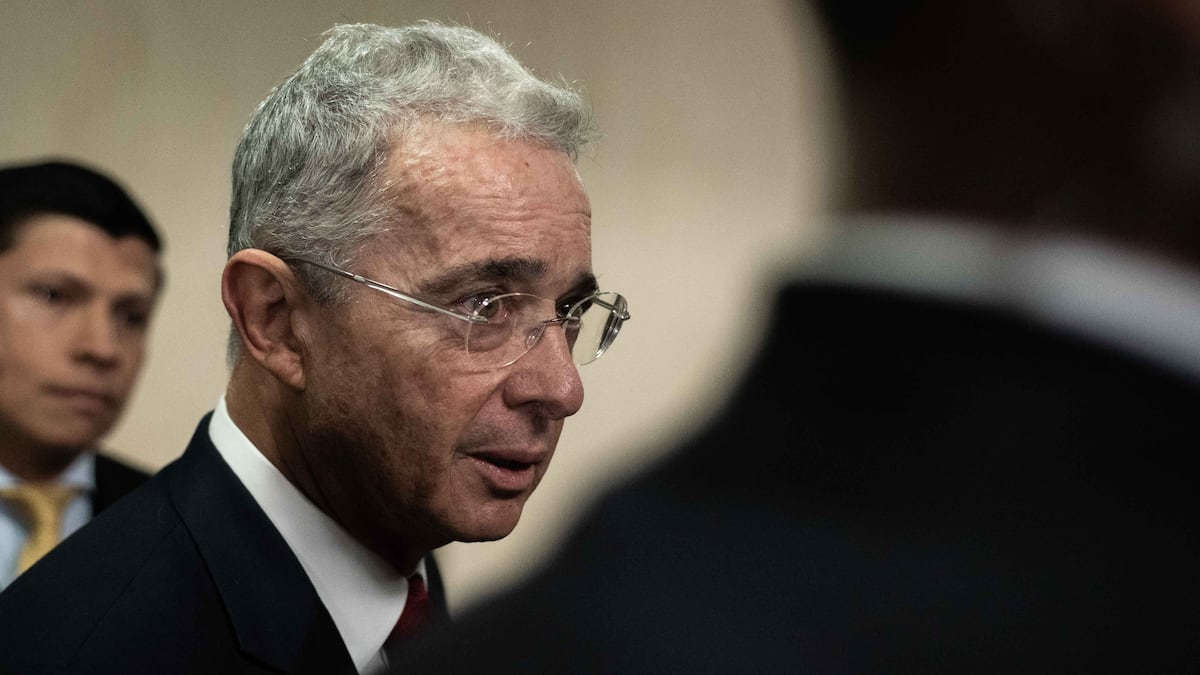The prosecutor’s office formally accused former President Álvaro Uribe of bribery and witness manipulation

The verdict of Sandra Heredia, the 44th criminal judge of Bogotá, will go down in history. It has been decades since a former Colombian president participated in a criminal trial from the dock; the most recent would be Álvaro Uribe Vélez. After a two-day judicial hearing – it began on May 17 and resumed this Friday – in which he heard arguments from the prosecutor’s office and the defense, the judicial officer found that there were sufficient reasons for the most popular and powerful politician in the country in the last two decades, who managed to reform the Constitution to his advantage to accumulate eight years in government (2002-2010), to be tried for crimes of bribery, procedural fraud and bribing witnesses in criminal proceedings. Although the former president’s defense lawyer Jaime Granados asked the judge to declare invalid the process, which has been under general jurisdiction for nearly four years after Uribe renounced his senatorial privileges in 2020, the arguments of prosecutor Gilberto Villarreal prevailed, the first of five prosecutors to decide to bring formal charges. Although the trial could last months or years, its start shows how drastically a leader’s fortunes can change.
The process had its origins in February 2018, when the Supreme Court dismissed a criminal complaint filed four years ago by Uribe, then a congressman at the head of the Democratic Center party, against leftist senator Iván Cepeda, the Polo Democratica Alternative. According to the former president, Cepeda had tried to manipulate witnesses to show his alleged links with paramilitary groups. The court’s magistrates, after evaluating the evidence, concluded that there was no support for said crime and that, on the contrary, there were reasons to believe that the complainant was the one who committed the crime. The magistrate added that, through his lawyer Diego Cadena, Uribe had offered gifts to former paramilitaries so that they could accuse Cepeda of distorting their testimony. The process remained relatively stagnant for some time.
In 2020, amid the confinement due to the coronavirus and when one of Uribe’s disciples—Iván Duque—assumed the position of head of state, the Supreme Court’s investigative chamber ordered the then senator into preventive detention to prevent him from obstructing the investigation against him. The former president being deprived of his liberty unleashed a wave of mixed reactions in the country, especially because he was one of the most charismatic figures of the right. At the recommendation of his lawyers, Uribe resigned his seat, thus losing jurisdiction and his file passing into the hands of the Attorney General’s Office. The condition was to receive benevolent treatment, since the unit was headed by Francisco Barbosa, a close friend of Duque. The then Attorney General assigned the investigation to a subordinate, who asked the court to stop the process, pointing out that there was not enough evidence to accuse the former president of any crime. Unsuccessfully. This attempt was repeated twice, with the case falling to prosecutor Gilberto Villarreal in January. Barbosa’s term was about to end and Villarreal took the path of filing charges, which were accepted by Judge Heredia this Friday.
The process began on May 17. The main novelty was the addition of the indictment. In addition to holding the former president responsible for bribery in criminal proceedings and procedural fraud, Villarreal also added the crime of bribery. In his opinion, there is enough material to believe that lawyer Diego Cadena, following Uribe’s orders, also offered to accuse former attorney generals Eduardo Montealegre and Jorge Perdomo of trying to link the former president’s brother Santiago Uribe with paramilitary groups. The inclusion of this third crime was used as an argument by Uribe’s defender Jaime Granados, requesting the cancellation of the process, alleging violations of due process. Since the hearing had been going on for more than 10 hours, Judge Heredia decided to suspend it for a week.
The hearing continued this Friday, May 24. Meanwhile, the former president broke his truce with President Gustavo Petro, his political rival for decades. Although the outcome of that clash remains to be seen, not that of the hearing: it was unfavorable for the leader of the Democratic Center. The judge categorically rejected the annulment request presented by Granados, opening the door for the trial to begin. However, the lawyer fired his last bullet by filing a complaint requesting that the Superior Court of Bogotá, the hierarchical link above the judge, define whether an appeal against the rejection of the annulment request is appropriate.
The judge credited Montealegre, Perdomo, Iván Cepeda and Deyanira Gómez, the wife of the main witness in the process, Juan Guillermo Monsalve, as victims. The defense also appealed the decision. “After the charges have been properly prepared against Mr. Álvaro Uribe, who from this moment acquires the status of accused, at this moment we proceed to the evidence discovery phase,” Heredia said. It is now up to the prosecutor’s office to decide what evidence it wants to present during the trial. After years of uncertainty, the judicial process against Uribe has formally begun.
News bulletin
Analysis of current events and the best stories from Colombia every week in your mailbox
Receive
Subscribe here For more on the EL PAÍS newsletter about Colombia WhatsApp here for the channelAnd get all the information keys on current events in the country.
(TagstoTranslate)Colombia
